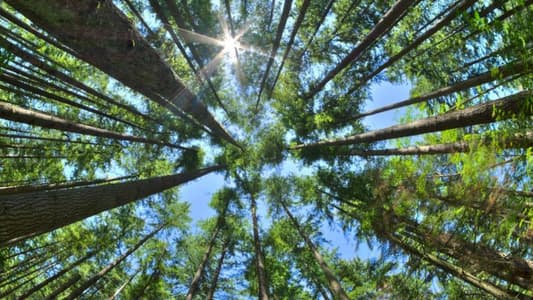Planting billions of acres of trees in an area the size of the US could be the “most effective climate change solution to date”, researchers say.
A study found there is the potential for an extra 900 million hectares (2.2 billion acres) of tree cover in areas that would naturally support woodland and forests.
As they grow and mature, the trees could absorb and store 205 billion tonnes of carbon, the analysis published in the journal Science suggests.
If that mostly came from the atmosphere, it could tackle around two thirds of the 300 billion extra tonnes of carbon which is in the atmosphere because of human activity since the industrial revolution.
In their study, the Swiss scientists from the Crowther Lab say it “highlights global tree restoration as our most effective climate change solution to date”.
However, other experts claimed the study over-estimated how much carbon such forest restoration could take out of the atmosphere, and that the focus should instead be on eliminating emissions from fossil fuels.
Professor Tom Crowther, senior author of the study, said: “We all knew restoring forests could play a part in tackling climate change, but we had no scientific understanding of what impact this could make.
“Our study shows clearly that forest restoration is the best climate change solution available today and it provides hard evidence to justify investment.
“However, it will take decades for new forests to mature and achieve this potential.
“It is vitally important that we protect the forests that exist today, pursue other climate solutions, and continue to phase out fossil fuels from our economies in order to avoid dangerous climate change.”
In the UK, an estimated 4.6 million hectares of tree cover could be created, much of it on grazing land which could continue to support livestock while providing carbon storage, the researchers say.
The analysis used almost 80,000 high resolution satellite images of protected areas to assess natural levels of tree cover in areas ranging from Arctic tundra to savanna, open woods and dense forests.
The Crowther Lab found that forests could be regrown on 1.7 to 1.8 billion hectares of land in areas with low human activity that are not currently used as urban or agricultural land, adding 900 million hectares of tree cover.
The study led by Dr Jean-Francois Bastin also suggests that there is further potential to regrow trees in croplands and urban areas.
The researchers estimate 700 million hectares of tree cover could be added through city trees and “agroforestry” - for example planting lines of apple trees through crops in the UK.
Commenting on the study, Professor Simon Lewis, from University College London, said the estimate that the extra forests could store 200 billion tonnes of carbon was “too high”.
He added: “New forests can play a role in mopping up some residual carbon emissions, but the only way to stabilise the climate is for greenhouse gas emissions to reach net zero, which means dramatic cuts in emissions from fossil fuels and deforestation.”






TWEET YOUR COMMENT